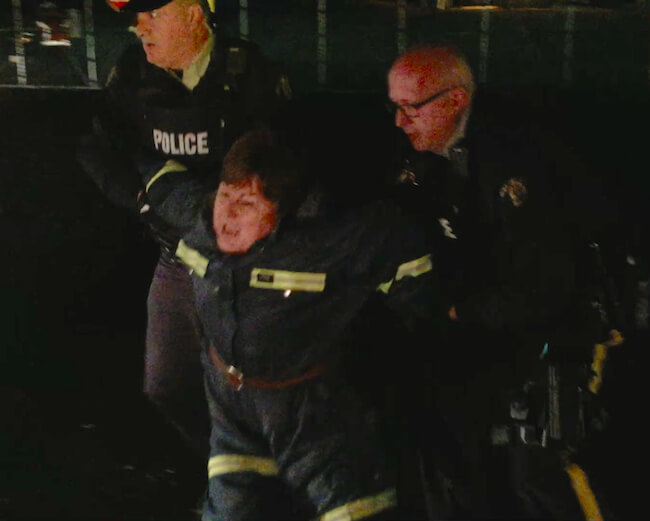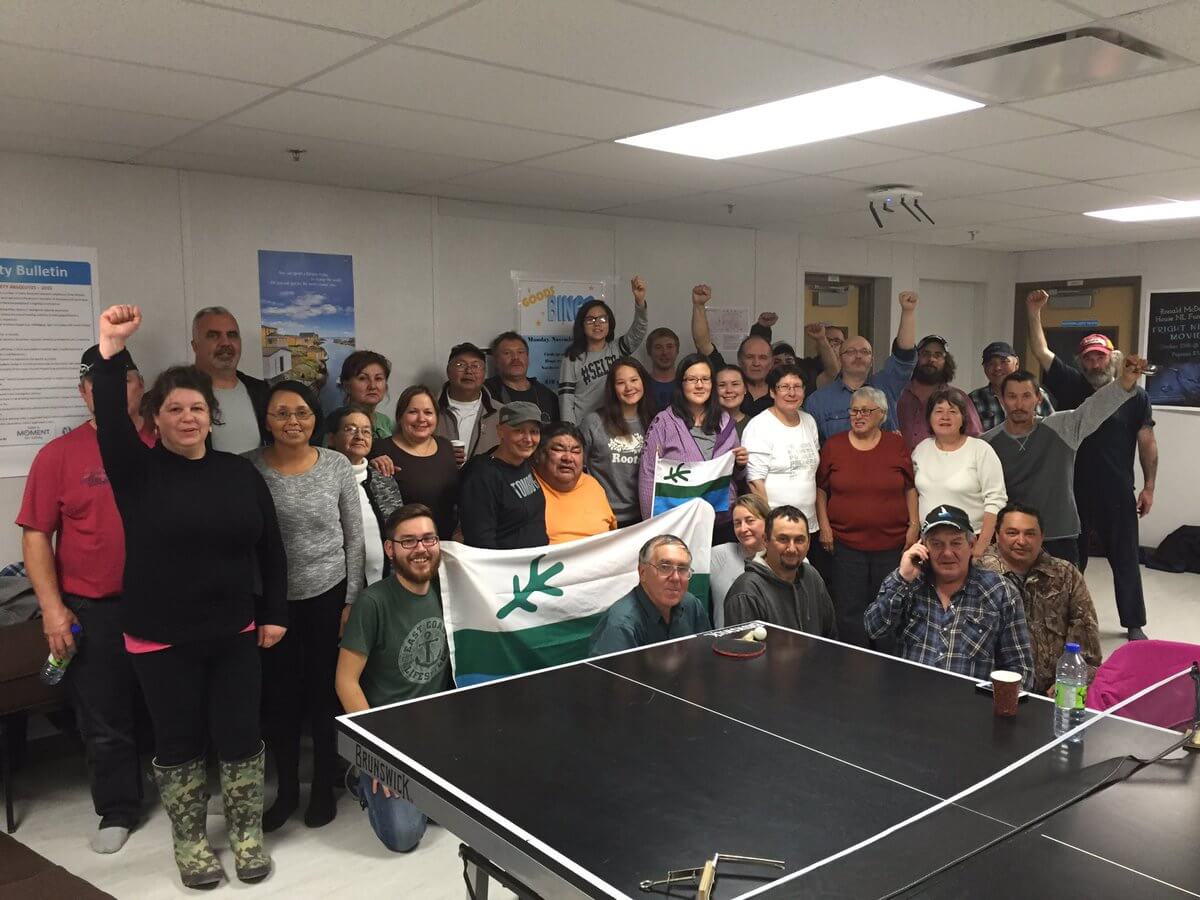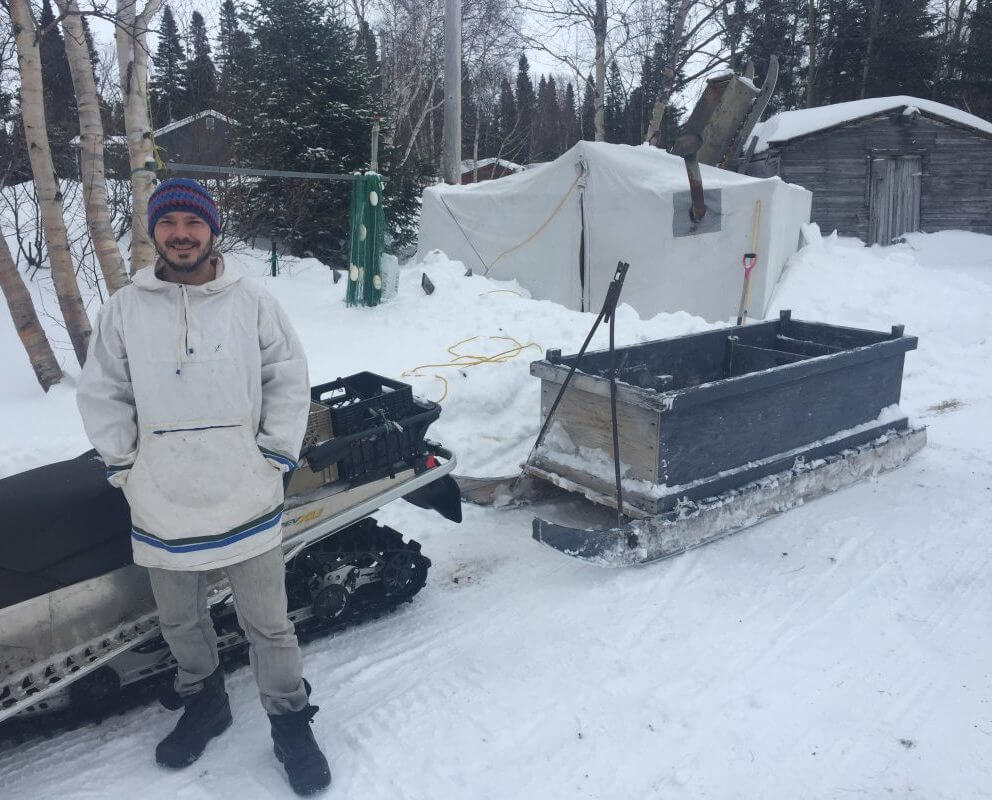
Land protectors who protested the Muskrat Falls hydro project in Labrador last fall could be facing jail time, an outcome that, according to a prominent Indigenous lawyer and scholar, would perpetuate a disturbing trend in Canada’s justice system.
Mi’kmaw lawyer and Ryerson University’s Associate Professor and Chair in Indigenous Governance Dr. Pam Palmater told The Independent this week that the criminalization of Indigenous Peoples protesting as a form of self-defence is becoming “more and more prevalent” in Canada despite the fact the protests themselves are an effort to guard constitutionally-protected rights.
Palmater, who has published extensively on Indigenous rights and sovereignty and was a leading figure of the Idle No More movement, said the RCMP should be “protecting and defending those constitutional rights,” but instead are charging those Indigenous people who are forced to do so themselves.
“Even when it’s a small charge, charges have an impact on Indigenous people—it’s a pipeline to other charges, it’s a pipeline to higher sentences, it’s a pipeline to being arrested and possibly facing prison time,” she said, citing the 2013 Mi’kmaq-led protests in Elsipogtog in New Brunswick that ended in a violent RCMP raid of a protest camp.
Earlier this month the RCMP announced 58 criminal charges against 27 mostly Indigenous land protectors who blockaded and then occupied the Muskrat Falls site in Central Labrador. Most of those criminally charged already face civil contempt charges for defying a court order after entering and occupying the site on Oct. 22.
“The RCMP respects and protects the right to peaceful demonstrations as guaranteed under the Canadian Charter of Rights and Freedoms,” the federal police said in the March 7 press release announcing the charges. “The role of the RCMP when unlawful acts occur during a demonstration is to ensure public safety, preserve the peace and enforce the law while upholding the fundamental freedom of peaceful demonstrators.”
The occupation was broadcast exclusively by The Independent, and this journalist faces both civil and criminal charges for that coverage. In response to an injunction granted to Nalcor by Supreme Court Justice George Murphy on Oct. 24 that explicitly named me, I left the project site and The Independent ceased its coverage from inside the occupation.
On Oct. 25, three days into the occupation, Premier Dwight Ball held an eleventh-hour marathon meeting in St. John’s with Indigenous leaders. An agreement was reached to address projected methylmercury contamination of traditional foods based on four demands put forth by three hunger-striking Inuit artists and youth.
To that point, Indigenous and non-Indigenous people in Labrador and the governing bodies of two Inuit groups had exhausted diplomatic and lawful avenues to protect locals’ traditional foods in downstream marine ecosystems.
A peer-reviewed study led by researchers at Harvard and Memorial University projected that flooding without fully clearing the reservoir would expose Inuit living downstream to unsafe levels of methylmercury.

Dozens of land protectors occupied the Muskrat Falls main workers’ camp on Oct. 22, 2016. Photo by Justin Brake.
The provincial Liberal government responded by promising to do the best it could to minimize methylmercury production post-flooding, but in the event levels exceed Health Canada guidelines, the government said it would issue consumption advisories and financial compensation to affected families.
Upon appointing himself as Minister of Labrador and Aboriginal Affairs in 2015, Ball promised to “lead the implementation of the calls to action set out in the interim report of the federal Truth and Reconciliation Commission which are applicable to the provincial government,” including the United Nations Declaration on the Rights of Indigenous Peoples (UNDRIP).
UNDRIP explicitly prohibits governments from destroying Indigenous lands, waters, food and ways of life for profit or any other reason.
In November former Environment Minister Perry Trimper told The Independent the results produced from ongoing methylmercury monitoring in the Muskrat Falls reservoir would be published on the government’s website any day. That information has still not been made public.
This week Ball and NunatuKavut Community Council President Todd Russell both told The Independent the province and Indigenous leaders were close to reaching a consensus on the terms of reference for the agreement.
Happy Valley-Goose Bay resident Marjorie Flowers, who originally hails from the Nunatsiavut community of Rigolet, has been arrested three times resisting the Muskrat Falls dam.
Flowers faces three criminal charges, including failure to comply with condition of Undertaking or Recognizance since she went on to the site after signing an undertaking following a previous arrest saying she would not do so.
This week Flowers told The Independent being incarcerated would change her life drastically. “I have a job, I have a mortgage, I have a truck payment.
“But at the same time I feel that it’s a risk that I took, [and] if the judge comes down hard I’m prepared to accept whatever it is.
“I stand by my conviction — bottom line,” Flowers continued. “We’re doing it for our culture, for a whole entire way of life — not just for ourselves individually, my god.”
Dennis Burden of Port Hope Simpson also faces criminal charges for participating in the occupation at Muskrat Falls.
In 2012, the fisherman and tourism operator chopped part way through a hydro pole linked to the Muskrat Falls project as an act of civil disobedience. In 2014 a judge ordered him to pay Nalcor $8,000 in restitution to replace the pole.
Now, on charges of mischief over $5,000 and disobeying a court order, Burden faces more serious punishment. If he is convicted, he fears he won’t be able to support his two daughters.
“One just started university a couple years ago, and I got another one heading off in a couple years. And they need me not to be in jail,” he told The Independent this week.
Burden also worried that, given his financial situation, the criminal charges could lead to the repossession of his home and belongings.
“Can they come and boot my girlfriend and my kid out of my house and come after them too for money?” he said. “It’s really, really hard to decide what I’m going to do next, but the decision is: You leave your kids on the street with no money, or you try and make a better world for them.”
Palmater said the Muskrat Falls controversy highlights other significant problems with how Indigenous Peoples are treated in Canada’s justice system.
“One of the big misunderstandings in Canada is that there’s something called the ‘Rule of Law’,” she said. “In fact, it should be called the ‘Rule of Laws’, because Indigenous laws predate any Canadian laws, and Indigenous laws are still in effect. Nothing has been done to extinguish those laws, and the Supreme Court of Canada has long realized that we were here with our own governments with our own laws, and there’s nothing to say that Indigenous laws can’t work alongside the imposed Canadian laws.”
On Thursday, Ball echoed the RCMP’s comment that people’s right to protest and freedom of expression should be respected, but went on to say that “we also have the rule of law, and we must respect that as well,” he told The Independent.
Asked if he would advocate for amnesty for Newfoundland and Labrador’s Indigenous people in cases where they have been charged for defending their rights and protecting the things the TRC report and UNDRIP say they need to continue their way of life without interference, Ball said the provincial government “support[s] people’s right to expression, their opinions, their beliefs, and so on. But we must do that in a law-abiding fashion, and that is kind of fundamental of where the system is, regardless if it’s with our Indigenous communities, or whether it’s Newfoundlanders and Labradorians in a more general sense.
“The last thing we want is a premier, or any leader, interfering with our law, and interfering in justice. [We must] always protect our right of expression…but we must do it in a law-abiding fashion,” he said.
Palmater said when it comes to the treatment of Indigenous land defenders the federal and provincial governments “are not even following Canadian law — they’re not respecting the Charter of Rights and Freedoms and all of our liberties. They’re not respecting Section 35 and the right of people to protect their land and territories.
“We have the right to protect our lands from destruction,” she continued. “In fact, the Supreme Court of Canada said in Delgamuukw [v. British Columbia] that Indigenous lands cannot be used in a way that’s inconsistent with how [Indigenous Peoples] always held them.
“If law enforcement was enforcing all of the laws in Canada, we wouldn’t have any problems. But they’re not even enforcing their own laws, let alone Indigenous laws, and that’s where we have the problem.”
Palmater also noted that when RCMP arrest Indigenous people in the midst of protecting their rights against government and corporate encroachment, they are “enforcing corporate privileges.”
On Oct. 22, after land protectors broke through the front gate, provincial Justice Minister Andrew Parsons wrote a letter to the RCMP requesting redeployment of officers.
“I am concerned about the well-being of all individuals at the Muskrat Falls site along with those in Happy Valley-Goose Bay,” he said in the letter obtained by The Independent. “I am writing in accordance with article 9.1(a) of the Provincial Police Services Agreement to request the redeployment of RCMP officers to the extent necessary to ‘maintain law and order, keep the peace and protect the safety of persons or property’ at the Muskrat Falls site in Happy Valley-Goose Bay generally.”
During an interview last month in Happy Valley-Goose Bay with land protectors and others opposed to Muskrat Falls, Happy Valley-Goose Bay resident Michelle Kinney said people always talk about how Indigenous people are “more prevalent in the justice system, and don’t have the power to fight against it,” and that law enforcement’s response to the Muskrat Falls resistance reveals a disparity between Indigenous and settler ideas of justice.
“If [people are] doing things that are wrong they deserve to be punished, but I think it’s become really clear to people that you don’t necessarily have to do anything wrong to be punished,” she said, adding if she’s learned anything from the events at Muskrat Falls, “it’s what this is teaching our children.”
Palmater said it’s “always the people with the least [who] put their bodies on the line, literally, to defend the lands and waters for everybody else,” and that those people need better support from the community.
“We need to evolve the social justice movement to find ways in which we can wrap our arms around the people who are willing to put their bodies on the line, because that’s a huge sacrifice—one of the biggest sacrifices anyone can make.”
Palmater added land protectors and others on the frontlines to protect Indigenous rights, lands and waters are today’s “warriors”, and that being a warrior is “not something you can ask of anyone.
“All we can do is be thankful for the people who do that, and actually support them in a wide variety of ways: publicly, by applying political pressure, trying to make sure they have adequate defence. Because that warrior spirit to protect our people — it’s a rare quality. People need to realize that these people are defending us in our own territories.”
Land protectors from Labrador’s three Indigenous groups have told The Independent their leaders—Nunatsiavut Government President Johannes Lampe, NunatuKavut Community Council (NCC) President Todd Russell, and Innu Nation Grand Chief Anastasia Qupee—have not offered legal or financial support to those being charged.
Lampe and Qupee could not be reached for comment, but in an interview earlier this week Russell told The Independent that while he shares “some of the same concerns” around Muskrat Falls as NCC members who took part in the blockade and occupation of the project site, those members “participated in activities not under the leadership and direction of the NCC.”
Russell said the NCC has “not made any decision about providing legal representation for individuals,” and that they are looking at the possibility of challenging the Oct. 16 injunction in the courts.
“We have serious concerns with the injunction itself, and the pervasiveness of the injunction and whether it is legal in and of itself,” said the former Liberal MP for Labrador.
On Oct. 17, the same day nine people participating in the blockade outside the main gate to the Muskrat Falls project were arrested and detained by RCMP, Russell held a press conference in Happy Valley-Goose Bay announcing the NCC was officially throwing its support behind the protests. He then tore up the court order in front of journalists.
The next day Russell and about eight or 10 NCC members travelled up the Churchill River to Muskrat Falls and disembarked on to the site to “assert their Aboriginal rights” to the land. They were confronted by Nalcor security and asked to leave. After approximately a half hour they left on their own accord.
Russell, NunatuKavut Elders Jim Learning, Lloyd Pardy, Richard Michelin and the others then visited another part of the site, a beach near the North Spur, where they shared food and tea around a fire before returning by boat to the same location, near the spillway, where they had previously disembarked.
The Independent broadcast most of these actions on its Facebook page.
Russell and several others were arrested in 2013 for protesting Muskrat Falls on the Trans-Labrador Highway outside the main gate. Those charges were later dropped when the injunction was thrown out by the court.
Flowers, a Nunatsiavut beneficiary, said she and many land protectors feel abandoned by the Indigenous leaders and are forging a path of their own to defend their rights.
“I don’t have any hope for what they would do for us,” she said, adding Lampe has not met with land protectors since the Indigenous leaders struck an agreement with the province and the occupation ended.
The land protectors and their supporters share a deep sense of duty to protect the environment.
“On the one hand, you look around this planet you see what’s going on — this is a very fragile place we’re living on here; it’s unreal what the destruction is,” said Burden.
“She’s dying really fast. So do you fight that battle?” he continued. “I can’t see me not fighting this battle for the future for my kids. You look around and people are dying from smog and pollution, and water is not fit to drink, and our food is now being polluted. Somebody has to do something, and for some reason I feel one of those people is gonna have to be me. But then on the other hand, I don’t have any money, I’m a step or two away from bankruptcy…and there’s only so much I can do, and I don’t want the justice system to come in here and boot my family out on the streets.”
Billy Gauthier, the Inuit artist who launched a hunger strike and put forth the four demands to the government and Nalcor to address the methylmercury issue, said he’s eagerly awaiting the government’s announcement of the terms of reference for the agreement with Indigenous leaders.

“If for some reason they decide they aren’t going to remove the soils and are going to contaminate the waters…why should I be off the hunger strike?” Billy Gauthier told The Independent in February 2017. Photo by Justin Brake.
“If for some reason they decide they aren’t going to remove the soils and are going to contaminate the waters,” Gauthier told The Independent last month at his home in North West River, “then there was no real agreement, and, therefore, why should I be off the hunger strike?”
Gauthier said he will resume his hunger strike if the government or Nalcor don’t fulfill the terms of the agreement, and that he doesn’t “care how much it costs [to clear the reservoir], because these waters, and the abundance of life in the waters, is important to us. We’re not just going to let it be destroyed because somebody wants to save a few bucks. I don’t care how much money it is.”
Jennifer Hefler-Elson, one of dozens of land protectors facing civil charges for protesting outside the project’s main gate, told The Independent last month she joined the effort to stop Muskrat Falls because she has an obligation to her descendants.
“I’m going to be an ancestor one of these days,” she said, “and my grandchildren or great grandchildren are going to say, ‘My ancestor fought against this project and helped shut it down…because she was one of the ones who stood up and said this is not gonna happen on our watch.’”
Disclosure: Dennis Burden donated to a fundraising effort last fall to help The Independent get to Labrador to report on how the Muskrat Falls project was impacting locals.

Indigenous Peoples are putting their bodies on the line and it's our responsibility to make sure you know why. That takes time, expertise and resources - and we're up against a constant tide of misinformation and distorted coverage. By supporting IC you're empowering the kind of journalism we need, at the moment we need it most.